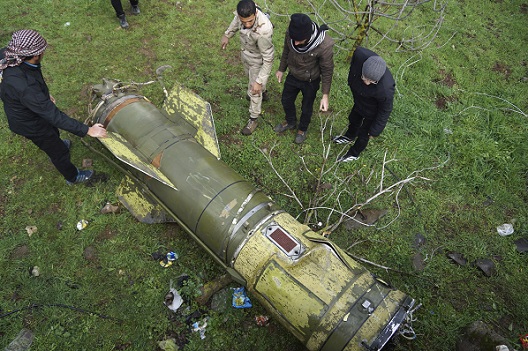 The cessation of hostilities in Syria originally scheduled to take effect on or about February 19 is now slated—per a Russia-United States joint statement—to take effect on February 27. Although Syrian rebel groups are being invited (along with the Assad regime and its external supporters) to signal acceptance of UN Security Council Resolution 2254 and to cease hostilities on the appointed date and time, effective implementation of the cessation accompanied by humanitarian relief for millions of Syrians is entirely dependent on the goodwill, decency, and compassion of three persons: Vladimir Putin, Ali Khamenei, and Bashar al-Assad. If a five year sample of these character traits qualifies as scientific, optimism should be kept on a tight leash.
The cessation of hostilities in Syria originally scheduled to take effect on or about February 19 is now slated—per a Russia-United States joint statement—to take effect on February 27. Although Syrian rebel groups are being invited (along with the Assad regime and its external supporters) to signal acceptance of UN Security Council Resolution 2254 and to cease hostilities on the appointed date and time, effective implementation of the cessation accompanied by humanitarian relief for millions of Syrians is entirely dependent on the goodwill, decency, and compassion of three persons: Vladimir Putin, Ali Khamenei, and Bashar al-Assad. If a five year sample of these character traits qualifies as scientific, optimism should be kept on a tight leash.
President Barack Obama and Secretary of State John Kerry have issued statements reflecting great caution, and rightly so. The decision to deem the Nusra Front totally beyond the pale of any combat pause gives Russia, Iran, and the regime full authority—should they choose to exercise it—to continue their offensive well beyond February 27. Moscow need only claim it is bombing Nusra Front targets to sustain its murderous assault on Syrian civilians. “Delineating” areas where Nusra exists will be an inexact science at best. And as it stands, the Joint Statement acknowledges—”authorizes” would be too strong a word—that Russia will continue its aerial outrages for another several days.
Also continuing, unless Moscow decides to the contrary, will be ground assaults by Shia militiamen brought to Syria by Iran. Prominent among them are gunmen belonging to Hezbollah, Iran’s Lebanese franchise. Hezbollah has, over the years, distinguished itself for murdering Americans, Jews, and prominent Lebanese. It has long held a prominent position on the American roster of terrorist organizations, and its members continue to accumulate sanctions for drug trafficking, money laundering, and other illegal acts. Yet in the upside-down world of the Vienna process it does not qualify as a terrorist organization. Neither does the so-called Syrian government: designated by Washington as a state sponsor of terror since 1979. Neither, for that matter, do the “Aerospace Forces of the Russian Federation,” who have distinguished themselves in Syria by taking out hospitals and schools.
When the “cessation of hostilities” term first surfaced in public, UN Special Envoy Staffan de Mistura commented that the advantage of this concept over a conventional ceasefire was that it required simply a decision—not a compendium of terms to be arrived at by multiple parties. He was correct. In the immediate wake of the February 12 Munich conference Russia had the option of pausing its offensive immediately, both to mitigate a growing humanitarian emergency and to give diplomacy a chance. It has that option now. Instead it has purchased several more days—perhaps many more—to continue its deadly work.
Indeed, the new Joint Statement aims not to offend on the subject of civilian protection. It calls on the pertinent parties to cease attacks on one another and to permit humanitarian aid to reach needy civilians. Although it requires all concerned to accept UN Security Council Resolution 2254 which, inter alia, demands the implementation of Resolution 2139 (which bans attacks on civilians), there is no straightforward language on the imperative of protecting civilians. And then there is this: “All parties further commit to work for the early release of detainees, particularly women and children.” Even this basic demand, one whose urgency was illustrated long ago by the “Caesar” photographic records of Assad regime torture and starvation of prisoners, could not be articulated without the “work for” weasel words.
One hopes that hostilities will subside substantially on February 27, if not immediately. One prays that aerial attacks on civilians will stop, that sieges creating open-air prisons for a million Syrians will be lifted, and that prisons themselves will be emptied of political detainees: starting with children and women, but moving on to the rest with dispatch. One earnestly wishes that political transition negotiations will begin and conclude quickly. One doubts—with great regret and foreboding—that any of this will happen.
If all of it happens—which it should—one of two things will have been responsible for unaccustomed good news in Syria. Either the leaders of Russia, Iran, and the Syrian regime were moved by genuine concern and compassion to stop the slaughter and set the stage for a united Syrian front against barbarians in Raqqa; or the United States convinced the leaders of Russia and Iran that something profoundly unpleasant was in store for them in Syria if the slaughter continued. The Syrian people have suffered enough. They will not be too particular about the cause of whatever relief they get.
Frederic C. Hof is a Resident Senior Fellow with the Atlantic Council’s Rafik Hariri Center for the Middle East.
Image: Photo: Rebel fighters inspect a piece of a rocket that landed in an area that connects the northern countryside of Deraa and Quneitra countryside, Syria February 22, 2016. REUTERS/Alaa Al-Faqir TPX IMAGES OF THE DAY
